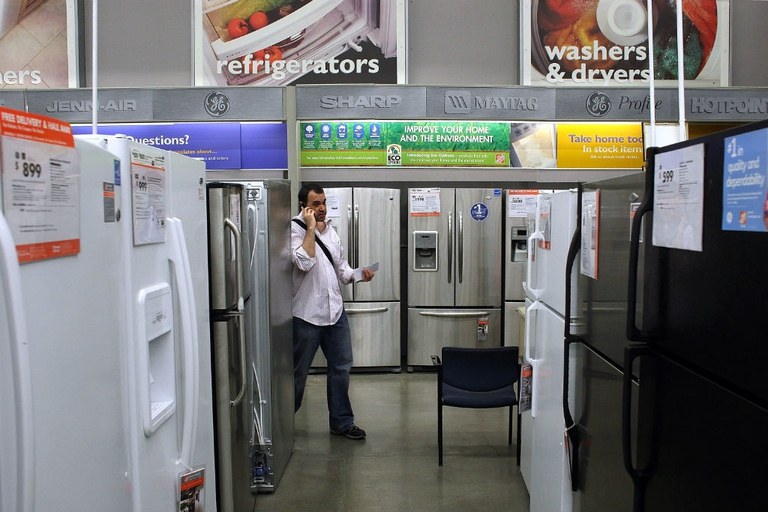
Mountain areas are home to around 1 billion people and provide goods and services. This is why the protection of healthy mountain ecosystems has become a must. The op-ed by FAO’s Mountain Partnership Secretariat.
Sweden’s Ministry for financial markets and consumer affairs has proposed to introduce tax breaks to citizens who repair broken objects and appliances instead of buying new ones. The proposal represents an incentive to reduce the use of resources while cutting CO2 emissions. Sweden will slash taxes The Value-added Tax (VAT) rate will be reduced from
Sweden’s Ministry for financial markets and consumer affairs has proposed to introduce tax breaks to citizens who repair broken objects and appliances instead of buying new ones. The proposal represents an incentive to reduce the use of resources while cutting CO2 emissions.
The Value-added Tax (VAT) rate will be reduced from 25 per cent to 12 per cent on repairs to bicycles, shoes, and clothes. This plan has been proposed in September and if voted could enter into force as of January 2017. Fixing appliances will be rewarded with tax breaks, saving 10 per cent on repairs.
“We believe that this could substantially lower the cost and so make it more rational economic behaviour to repair your goods,” said Per Bolund, Sweden’s minister for financial markets and consumer affairs. In 2015, at least 85,000 tonnes of fridges, refrigerators and other appliances have been recovered according to data provided by Sweden’s government. The new incentives aim at reducing the number of appliances that end up in landfills.
“Circular economy systems keep the added value in products for as long as possible and eliminate waste. They keep resources within the economy when a product has reached the end of its life, so that they can be productively used again and again and hence create further value,” reads a communication of the European Union.
#GrowthWithin demonstrated that #circulareconomy is a clear economic opportunity for Europe. https://t.co/vKJPCmMXVt pic.twitter.com/Fk3UKE8K23
— Ellen MacArthur Fdn. (@circulareconomy) September 30, 2016
The high-tech industry will benefit significantly. “The hi-tech industry monopolises a share in the global production of metals for 7 million tonnes yearly – amounting to over 77 billion dollars – it is clear that the recovery of renewable materials to be employed again in the productive cycle is fundamental to shift towards a more sustainable industry,” according to the Ellen MacArthur Foundation.
“I believe there is a shift in view in Sweden at the moment,” added Bolund. “There is an increased knowledge that we need to make our things last longer in order to reduce materials’ consumption”. Circular economy offers a great opportunity for reducing materials costs by 340-380 billion dollars yearly.
Siamo anche su WhatsApp. Segui il canale ufficiale LifeGate per restare aggiornata, aggiornato sulle ultime notizie e sulle nostre attività.
![]()
Quest'opera è distribuita con Licenza Creative Commons Attribuzione - Non commerciale - Non opere derivate 4.0 Internazionale.
Mountain areas are home to around 1 billion people and provide goods and services. This is why the protection of healthy mountain ecosystems has become a must. The op-ed by FAO’s Mountain Partnership Secretariat.
After Pantelleria, Italy in 2014, the Republic of Malta in 2015, and Gran Canaria, Spain in 2016, this year the Italian island of Favignana, off the coast of Sicily, will host the fourth edition of the Greening the Islands International Conference on the 3rd and 4th of November. The event marks an important opportunity to tackle the topic of
In a region grappling with excessive pollution and greenhouse gas emissions, climate change-induced droughts and floods, exacerbated by high coal-fuelled energy consumption, countries in Asia are exploring innovative clean and green financing products such as green bonds to move towards a sustainable, low carbon economy. As much as 7 trillion US dollars will need to be spent building new
A report by Ember explains that in 2025 electricity generation from renewables (solar, wind and hydropower) surpassed that from fossil fuel sources.
The Tyler Prize, considered the “Nobel Prize for the Environment,” has been awarded to Toby Kiers, an American biologist working in Amsterdam.
Belgium is one of the countries most exposed to climate change. Dune–dikes are a solution to curb sea-level rise.
Between October 2024 and September 2025, the average temperature in the Arctic was 1.6 degrees Celsius higher than during the 1991–2020 period.
Undeclared conflicts of interest, paid authors, lack of transparency: one of the most cited studies on glyphosate, published in 2000, has been retracted.
La moria delle api è anche un problema finanziario che potrebbe colpire a cascata i profitti di innumerevoli industrie e, quindi, i loro investitori.









